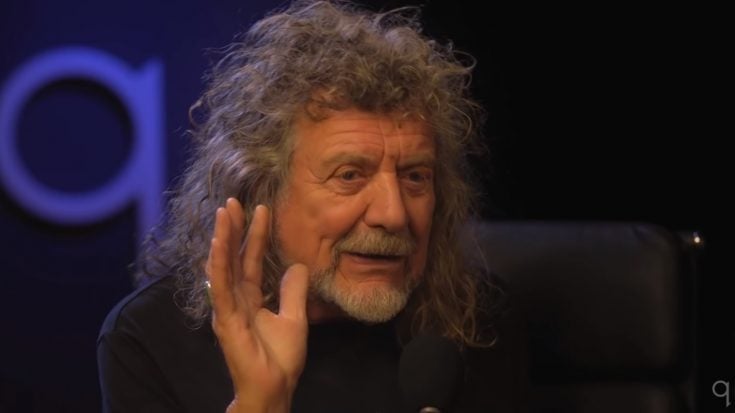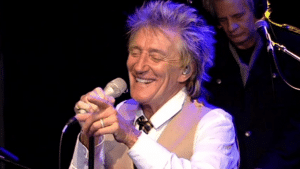Why Robert Plant Refused Jason Bonham’s Led Zeppelin Reunion Offer

Robert Plant in an interview - q on cbc / YouTube
Following Led Zeppelin’s disbandment in 1980, concluding a remarkable 12-year era of musical success, enthusiasts eagerly anticipated news of a potential reunion.
The catalyst for the band’s dissolution was the untimely death of their renowned drummer, John Bonham, in 1980, a tragedy that unfolded after a day of intense drinking. Bonham was discovered lifeless in Robert Plant’s residence by the band’s bassist, John Paul Jones, and tour manager, Benji LeFevre.
The impact of Bonham’s passing resonated not only within his immediate circle of family and friends but also deeply affected Plant. Their friendship, forged since the age of 15, had weathered the challenges of the music industry since 1964, a testament to the enduring bond between the two musicians.
Plant’s profound connection with Bonham was solidified when, after the dissolution of the Yardbirds, Jimmy Page sought to form a new band and Plant unequivocally recommended Bonham as their drummer. Despite his lack of formal drum lessons, Bonham’s unconventional approach elevated him to the status of one of the future’s preeminent drummers.
A reunion long yearned for
Post-Bonham’s demise and the subsequent dissolution of Led Zeppelin, each band member embarked on individual musical journeys.
While fans perennially yearned for a Led Zeppelin reunion, such occurrences were reserved for specific events over the ensuing four decades.
The initial reunion transpired in 1985 for Live Aid, a performance where they were not even introduced as Led Zeppelin.
Subsequent reunions occurred sporadically, with the Ahmet Ertegun Tribute concert in 2007 marking the last one, featuring Jason Bonham, Bonzo’s son, as the drummer, effectively stepping into his father’s iconic role.
Robert Plant’s reluctance
Despite Jason’s fervent desire for a Led Zeppelin reunion, Plant’s stance on the matter was unwavering and resolute. The pivotal moment came after the Ahmet Ertegun tribute concert in 2007 when Jason, presumably hopeful, inquired about the prospect of a reunion, only to receive a response that was both emotional and definitive.
In expressing his admiration for Jason Bonham’s rendition of their songs, the legendary frontman conveyed a deep and abiding love for his drummer friend, asserting that this affection was so profound that he couldn’t fathom continuing without him, regardless of the passage of time.
Plant’s sentiments reflected the inseparable connection forged with Bonham over the years, dating back to their shared experiences since the age of 15.
Despite the tantalizing allure of unprecedented offers, such as Virgin founder Sir Richard Branson’s staggering $800 million proposal, Plant, as the band’s successful frontman, grappled with a sense that reviving Led Zeppelin without Bonham would be inherently wrong.
“I can’t go out there and fake it”
In recounting the poignant exchange that transpired in 2018, Jason shared the heartfelt conversation he had with Plant on their journey back. Seizing the opportunity, Jason broached the subject that lingered in the hearts of fans worldwide: the potential reunion of Led Zeppelin.
Plant’s response, delivered with a mix of emotion and unwavering resolve, laid bare the profound reasons behind his reluctance to resurrect the legendary band.
Jason quoted his dad’s friend saying, “I loved your dad way too much. It’s no disrespect to you; You know the stuff better than all of us, and no one else who is alive can play it like you. But it’s not the same. I can’t go out there and fake it. I can’t be a jukebox. I can’t go out there and try to do it that way.”
The conversation touched on the essence of Led Zeppelin’s uniqueness, with Plant explaining that the band’s dynamics had irreversibly shifted with John Bonham’s departure from the world. Drawing a poignant parallel with another iconic band, The Who, Plant emphasized that attempting to replicate what they did would be a disservice to the vitality that defined Led Zeppelin.
A dignified farewell
The refusal to succumb to the lure of lucrative offers underscored Plant’s commitment to preserving the integrity and authenticity of Led Zeppelin’s legacy.
The emotional weight of his decision demonstrated not only a respect for Bonham’s unparalleled contributions but also a conviction that certain aspects of Led Zeppelin were irreplaceable and should remain sacrosanct.
Jason, understanding the gravity of Plant’s sentiments, gracefully accepted the outcome. The profound history shared between his father and Robert Plant, coupled with the realization that the band had reached its zenith, led Jason to embrace the closure that came with the Ahmet Ertegun Tribute concert in 2007.
In Plant’s words, the decision to conclude with one last monumental performance was a deliberate choice to honor the band’s legacy, signaling that Led Zeppelin had fulfilled its destiny and deserved a dignified farewell.












